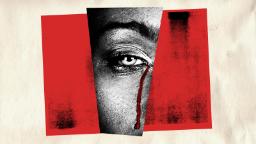It didn’t work. Hundreds of ultra-Orthodox Jews turned up on Mt. Meron Tuesday in defiance of the ban, according to the police.
“Suspects stormed a closed off mountain area and caused wide-scale disturbances that included throwing rocks at police and causing damage,” police spokesman Micky Rosenfeld said.
Through the evening, the numbers of people arrested kept ticking up: first 100, then 200, then more. In the end, 320 people were arrested for violating health and security measures, Rosenfeld said.
The mass arrests are the latest incident in a global trend with dangerous consequences — a small but committed segment of the ultra-Orthodox Jewish community from Israel to London to New York refusing to obey social distancing orders.
Two weeks before the Mt. Meron arrests, a large crowd turned out for the funeral of a prominent rabbi in the heavily ultra-Orthodox Jewish neighborhood of Williamsburg in Brooklyn, New York.
A week before that, police in London were called — twice — to disperse an ultra-Orthodox Jewish wedding in London’s Golders Green neighborhood.
In Israel, at least, the results for fervently observant Jews have been serious. About 50% of Israel’s coronavirus cases have been in largely ultra-Orthodox municipalities, according to a CNN analysis of Ministry of Health data through May 12. The country is about 14% ultra-Orthodox.
Israel has more than 16,000 confirmed cases of coronavirus and 265 deaths, according to data from Johns Hopkins University as of Thursday.
Prioritizing public prayer
The reasons that some ultra-Orthodox Jews have been reluctant to change their behavior are deep-seated: religious, cultural and demographic, experts said.
“It’s the center of their life, the religion, and they can’t live without it,” said Gilad Malach, the director of the Ultra-Orthodox in Israel Program at the Israel Democracy Institute. “The most important thing in their life is their religious behavior and traditions, and it’s very hard for them to change it. They see it as a religious obligation.”
The community’s lifestyle is centered around religion — and observant Jews gather three times a day to pray in a group.
“Prayer, according to Judaism, is something you can do alone — but the most favorable way to do it is in public. ‘In public’ in Jewish law means ten male adults. This is called the minyan, it’s kind of a quorum, and you do it usually in synagogues,” said Benjamin Brown, professor of Jewish thought at the Hebrew University of Jerusalem.
“Now synagogues are usually small places, crowded, it’s a very easy place to get an epidemic,” Brown said, so when it became clear that coronavirus was spreading worldwide, Israel’s government ordered synagogues and schools to close. Most complied, even within the most religious segment of Israeli society — but some of the most extreme ultra-Orthodox did not.
Many ultra-Orthodox Jews live largely cut off from society, intentionally limiting their access to outside influences and relying on their rabbis for guidance.
“Just half of the ultra-Orthodox society have access to the internet, and some of them just have it at work, and some of them don’t have TVs,” Malach said.
That’s because they don’t want to be exposed accidentally to improper influences, Brown said.
“The internet is a source of spiritual danger — which includes first sex, then violence, fake news, gossip and slander. All of these are considered very severe” violations of religious norms, Brown said.
As a result, when the Israeli government started issuing warnings through multiple channels — including maps showing where cases had been detected so that people could avoid them and self-quarantine — the most sheltered ultra-Orthodox communities didn’t see them, Malach said.
That left them relying on their rabbis for guidance — including Rabbi Chaim Kanievsky, 92, who initially said there was no need for religious school closures, Brown said.
Bnei Brak, the heavily ultra-Orthodox city where Kanievsky lives, became one of Israel’s coronavirus hot spots, along with parts of Jerusalem, which also has a large ultra-Orthodox population.
The community’s large families and relative poverty make social distancing very difficult.
“Part of their way of life is having many children — seven, eight, nine children is very common,” Brown said. “They live in small apartments. You can’t have social distancing, you can’t have isolation, definitely not when your children are not in school dormitories but came home.”
Malach put it bluntly: “They are stuck at home, they have nothing to do, and this makes it harder to follow the instructions.”
Most Jewish communities following guidelines
Rabbi Herschel Gluck, an ultra-Orthodox rabbi in London’s Stamford Hill neighborhood and community activist honored by Queen Elizabeth II for his interfaith work, told CNN only a small minority of the community are not following the prevention guidelines imposed by their governments.
“I think the vast majority of the haredi community is following the government’s guidelines,” he said, using the Hebrew word for the ultra-Orthodox. “I think that, sadly, in every community there are people who just don’t get it.”
“It’s like smoking, there are people who just don’t get it — there are doctors who know the dangers of smoking and you see them smoking. But the vast majority of haredi Jews are keeping the social distancing guidelines,” he said.
Some have come up with creative ways of meeting religious obligations while maintaining safe social distancing, Brown said.
“There came to be a nice phenomenon of people praying on the balconies so that together, from balcony to balcony, they joined as ten men together,” he said.
Judaism is not opposed to conventional medicine, he said. In fact, the opposite is true: Jews, including the most Orthodox, see the Biblical commandment to “protect your souls” as an obligation to preserve life that supersedes any other religious duty, Brown said.
Ultra-Orthodox Jews vs. the Jewish State
There is another factor driving opposition to social distancing among an extremist section of ultra-Orthodox Israeli Jews, Brown said: deeply held religious opposition to the existence of the State of Israel.
“They are anti-Zionist because they believe that — according to their religious belief — there is a prohibition to obey a government which is secular, and a prohibition against establishing a Jewish state before the coming of the Messiah. Only the Messiah can establish Jewish sovereignty and therefore they are really not just suspicious of, but hostile towards, the government,” Brown said.
Indeed, Chaim Grunfeld, an American-born ultra-Orthodox Jew who rejects the secular state of Israel, told CNN he moved back to New York after living in Israel because “the United States is a free country.”
Like many in his anti-Zionist ultra-Orthodox community, he rejected the Israeli government’s explanation that preventing the spread of the virus was the reason for the restrictions on large gatherings — restrictions especially frustrating to haredi Jews because they came during major spring holidays.
He said Tuesday’s clashes between police and the ultra-Orthodox on Mt. Meron were part of the secular state’s efforts to “oppress us,” as were orders to close ultra-Orthodox synagogues and schools.
He disputed Israeli government statistics saying that the virus outbreak was particularly bad among the ultra-Orthodox. And he said the ultra-Orthodox community was properly informed about the outbreak and behaving responsibly.
“When the doctors came out saying there is something going on, the rabbis said two things: Pray a lot — not new prayers, old prayers for when something [bad] is going on — and number two, they encouraged everyone to follow the guidelines,” Grunfeld said.
The coronavirus outbreak is prompting some changes in ultra-Orthodox society, Malach said.
A survey last month by TNS-Kantar for Israeli telecoms provider Bezeq found that 8% of ultra-Orthodox respondents said they had recently started using the internet, Israeli media reported. That’s nearly triple past numbers. More than half (52%) said they were using the internet more, and a quarter (25%) said they were watching more TV, Israeli reports on the April 6 survey said.
“At least 50% say they are using sites outside of Orthodox sites — [the news websites] Ynet and Haaretz — and this is dangerous for the leadership, but it is an opportunity to get access to information,” Malach said.
Back in Israel, Brown doubted that even the global pandemic would fundamentally alter the local ultra-Orthodox community’s refusal to integrate into the wider society.
“In Israel as a whole we haven’t crossed 300 deaths, so it’s not that bad,” he said.
Though some communities have been hit hard, ultra-Orthodox Jews in Israel may look at the pandemic and think: “That’s what providence wanted and I accept this as it is, but this is not a reason to change my way of life,” Brown said. “Haredim basically are satisfied with their lives – this way of life works for them.”
CNN’s Oren Liebermann in Jerusalem contributed to this report.





















































